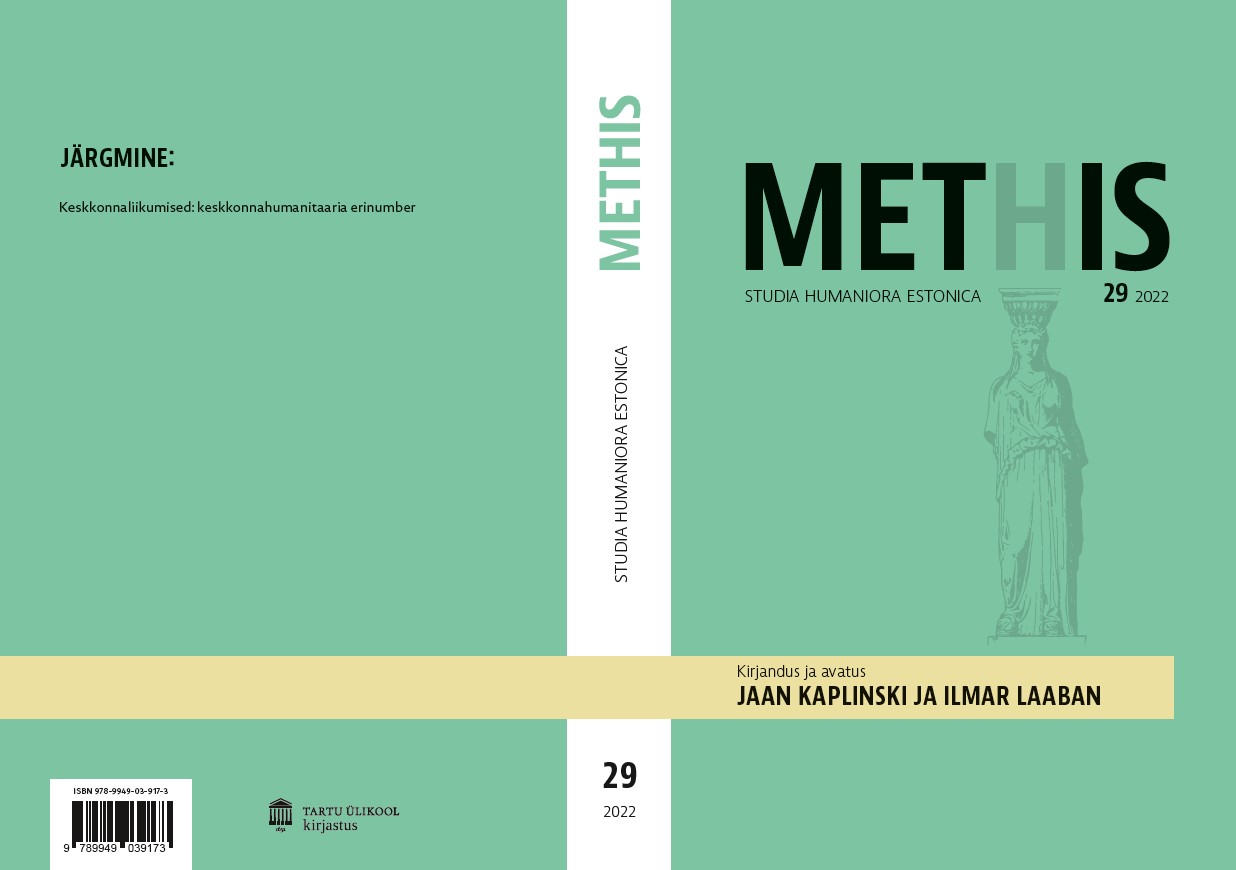Avatusse astudes. Jaan Kaplinski ja Ilmar Laabani loome kokkupuuted ja mitmekesisus. / Approaching Openness: Convergence and Diversity in the Creative Universes of the Poets Jaan Kaplinski and Ilmar Laaban.
DOI:
https://doi.org/10.7592/methis.v23i29.19027Keywords:
avatus, Jaan Kaplinski, Ilmar Laaban, Karl Popper, Umberto Eco, avatud ühiskond, avatud kunstiteos, luule, arhiivipärand, openness, open society, open work, poetry, archival heritageAbstract
The special issue of Methis on literature and openness brings together the oeuvres of two remarkable Estonian authors with an international scope: Jaan Kaplinski and Ilmar Laaban. They were poets, translators, essayists, original thinkers and public intellectuals whose works have travelled far beyond the boundaries of Estonian literature. Jaan Kaplinski (1941–2021) published more than 60 books in Estonia and equally many abroad, as his work has been translated into more than 30 languages. Ilmar Laaban (1921–2000) fled Estonia for an exile in Sweden to escape Soviet occupation in the spring of 1943. He has left his mark on Estonian literary history with his surrealist collection of poetry Rroosi Selaviste (1957) and practising the genre of text sound poetry in Estonian, Swedish and French.
Jaan Kaplinski’s name was put forward as a possible candidate for the Nobel prize in literature on several occasions. Laaban, who was well acquainted with contemporary European literature and its authors, translated into Swedish poems by the German-Jewish poet Nelly Sachs who received the Nobel prize in 1966, while Kaplinski rendered into Estonian poetry by Tomas Tranströmer, the Swedish recipient of the prize in 2011. Kaplinski also pointed out that it was the anthology 19 moderna franska poeter (1948), co-edited by Laaban and Erik Lindegren, that had given Tranströmer an impetus towards becoming a poet. In addition, similarities of outlook have also been observed between Tranströmer and Kaplinski himself. For instance, Ivar Ivask, a long-time editor-in-chief of the Oklahoma-based journal World Literature Today, underscored the significance of openness in Tranströmer’s poetry, while his dedicatory poems to Kaplinski and Laaban connect the authors with such notions as scope, infinity, openness, eternity and freedom. Openness appears as the core concept in this cluster of notions related to a lack of boundaries and contractedness in time, space and society that becomes manifest in the oeuvres of both Kaplinski and Laaban. Their works are also characterised by an intense engagement with the semantic possibilities afforded by different languages as well as employing linguistic regularities towards the end of formal innovation.
20th-century intellectual history, that provided the context for the creative growth of both authors, involved remarkable cases of addressing of the openness concept, notably by figures such as the philosopher Karl Popper and the semiotician Umberto Eco. Popper famously launched his concept of open society as one in which an individual has to face personal decisions, which opposes it to a magical or tribal totalitarian society. In the artistic realm, Eco discussed the open work that involves the audience’s collaboration with the author in detecting meaningful arrangements in the work, making artistic response an interactive process. Such plurality and multiplicity accompanies formal innovation that correlates with a modern, avant-garde feeling for life. The 20th century also gave rise to personality psychology that considers openness to be one of the key personality dimensions, the so-called Big Five. In psychology, openness involves receptivity to new experiences, creativity, intellectual curiosity, and an advanced aesthetic sense. Recent studies have shown that particularly the presence of the latter two components tends to be in correlation with an environmentally aware outlook.
Kaplinski and Laaban belonged to different generations and spent their formative years in markedly different conditions yet were united in the attention they paid to language as a system of signs and to studying its possibilities in their creative work, which in Kaplinski’s case was framed by an explicitly ecological take on life. The present special issue on literature and openness comprises six studies concentrating on facets of Jaan Kaplinski’s and Ilmar Laaban’s creative universes by literary scholars from both sides of the Atlantic. In addition, the issue includes two articles that deal with representing trauma in literature and theoretical issues in digital humanities. The issue concludes with the section of theory mediation presenting a translation of Ilmar Laaban’s Swedish-language article “Musiken, samhället, revolutionen” (“Music, society, revolution”, 1969) that is accompanied by a commentary by Hasso Krull.


